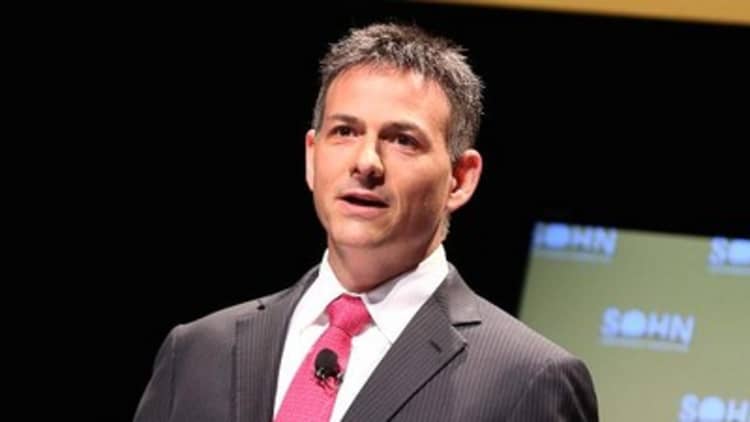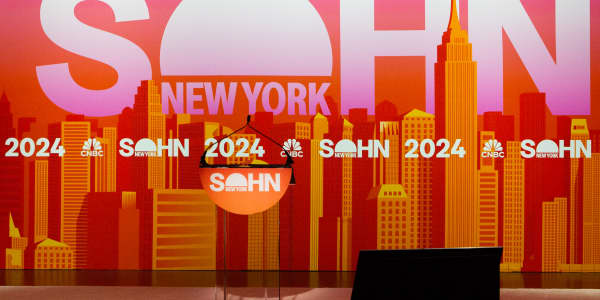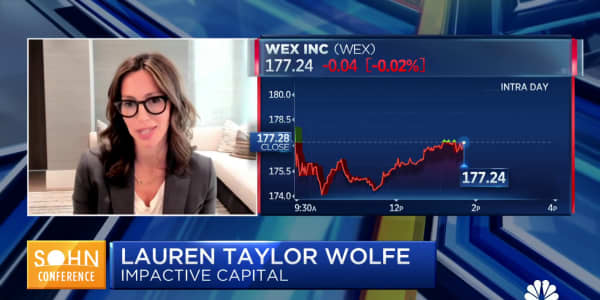
Hedge fund manager David Einhorn took a bruising in the markets last year, but at least one of his apparent strategies is now paying off handsomely: being short a basket of U.S. oil drillers.
At the annual Sohn Investment Conference in New York last May, Einhorn made a detailed case for selling, or going short, the oil company Pioneer Natural Resources. He argued among other things that a combination of low energy prices and overly optimistic accounting methods meant the driller was overvalued. Joking that Pioneer was the "motherfracker," Einhorn, known for his acerbic presentations, showed dozens of slides emphasizing his point.
"These companies have negative development economics, meaning that aside from a few choice locations, they don't earn a positive return on capital, but have a nearly infinite supply of negative return opportunities," one stated, referring to Pioneer and some of its competitors. "What should such a supply be worth? Not much. Yet, the share prices are very high and we believe are poised for a fall."
Now, just days before this year's Sohn conference next Wednesday, he's proved correct: Pioneer has fallen 1 percent and was down considerably more before the recent energy rally. Several other fracking companies he pooh-poohed (EOG Resources, the "fatherfracker," Continental Resources and Concho Resources) are down substantially as well, making them some of the few public stocks that behaved as Sohn presenters predicted they would.
Einhorn declined in an e-mail to comment for this story.
So far, 2016 is treating him far better than last. The hedge fund where he is president, Greenlight Capital, is up a hair over 3 percent through the end of March, thanks perhaps to his energy shorts as well as to long positions like Apple, Time Warner, Michael Kors, and Consol Energy. (Performance assumptions are based on Dec. 31 quarterly filings that may not reflect present positions, and Apple shares recently slid in to negative territory for the year.)
More current year-to-date figures for Greenlight will emerge after April's trading session ends. But the broader hedge-fund performance numbers for 2016 so far have been unimpressive. The typical fund fell nearly 1 percent through the end of March, according to HFR, and big players like Citadel, Pershing Square and Third Point fell even more.
The atmosphere is so bad that in a recent investor letter, Third Point management described 2016 as "one of the most catastrophic periods of hedge fund performance that we can remember since the inception of this fund" and predicted that a "washout" in hedge funds was soon to come.
At the Sohn conference where Einhorn unveiled his drilling short, a high-profile panel of fellow hedge fund managers touted a range of investment ideas, many of which proved to be utter dogs.
Omega Advisors chairman Leon Cooperman pitched a handful of stocks that subsequently sank into the red, including Actavis (now part of Allergan), AerCap and GM; of his selections, a few others, notably Alphabet (the former Google), rallied. Reached for comment Thursday, Cooperman said, "We continue to like AerCap, Allergan, Citigroup, and Google, and we flipped the GM and put it somewhere else. It's a long race. The game's not over."
Pershing Square founder Bill Ackman used the platform company Jarden — which rose 14 percent before an acquisition earlier this month — to explain how platform companies work. But his other picks — Platform Specialty Products and Valeant Pharmaceuticals — have performed terribly. (In a recent Pershing report, Ackman acknowledged Platform's poor performance, and he has admitted a "failure of due diligence" on Valeant, where he remains a large investor.)
And Glenview Capital Management founder Larry Robbins, known for his prowess in health care stock picking, stumbled with recommendations on Brookdale Senior Living and AbbVie. A Glenview official didn't immediately respond to a request for comment, but filings show that Glenview still holds both stocks.
Bond investor Jeffrey Gundlach, CEO of DoubleLine Capital, suggested buying Puerto Rican municipal bonds, which have struggled in the last year; in a public webcast in mid-April, Gundlach said that although the general-obligation bonds had fallen in price since his call last May, the 8 percent coupon they offered meant that purchasing them when he made his recommendation would have led to a zero percent return, "which is probably better than many asset classes."
Gundlach also warned investors to avoid U.S. high-yield bonds, and in the nine months that followed, they fell precipitously.
In addition to Einhorn, who's an annual fixture at the Sohn conference, Robbins and Gundlach are slated to return to the event this year.






